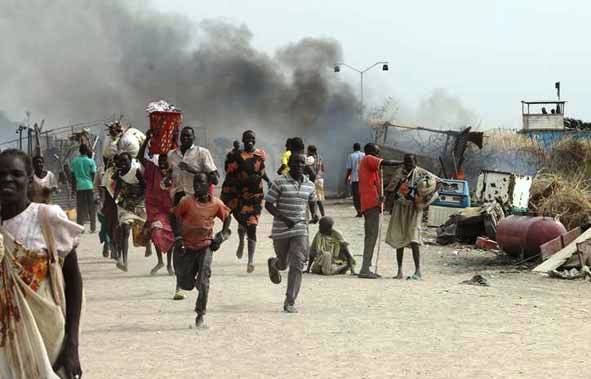HRW calls on UN to release report on Malakal IDPs incident in South Sudan

June 22, 2016 (NEW YORK) – The United Nations (UN) should make public the findings of two investigations it carried out into the February 2016 attack on civilians in a UN camp in Malakal, capital of Eastern Nile (Upper Nile) state, South Sudan, said the Human Rights Watch (HRW).
The “brutal attack” on the Malakal camp for civilians displaced from conflict in South Sudan reportedly killed at least 30 camp residents and injured 123.
The UN established a special investigation to examine the causes of violence, as well as an internal board of inquiry to review peacekeepers’ responses to the incident.
HRW said although the UN did the right thing, revealing the outcome of the investigation was necessary.
“The UN did the right thing by investigating both those responsible for carrying out this horrific attack and the lackluster peacekeeper response, but a behind-the-scenes inquiry is not enough,” said Akshaya Kumar, deputy UN director at Human Rights Watch.
“A camp that should have been a sanctuary came under fire, and no one has been held accountable,” said the statement released on Wednesday.
The Security Council was going to be briefed on both reports and their recommendations on 22 June, in a closed-door session. HRW said the outcome of the investigations should be made public by the UN.
“In the early hours of February 18, armed Dinka men, including soldiers from the government Sudan People’s Liberation Army (SPLA), forced their way into the camp, shot civilians, and systematically burned homes of Nuer and Shilluk civilians as UN peacekeepers stood by,” HRW statement said while referring to a summary of the findings.
“The investigation also found that the “Eastern Nile political leadership […] pursued a vigorous policy aimed at ensuring that the state would be exclusively for the Dinka ethnic group,” it added.
On February 16 and 17, fighting between youth inside the camp escalated along ethnic lines The UN Security Council condemned the attacks against civilians and the UN compound as possible war crimes.
A report on the UN response by the medical group Doctors Without Borders, or MSF, said the peacekeepers actively blocked displaced people in the camp from reaching safety during a large part of the emergency.
The UN board of inquiry report also recommends an investigation of each case of “underperformance of troops and police” and decisive action to “hold the troop contributing countries accountable, ultimately repatriating commanders and/or units.”
The UN peacekeepers in South Sudan are mandated by the UN Security Council to use force when needed to protect civilians from imminent harm.
The UN mission hosts nearly 200,000 displaced people on several of its bases. However, it has repeatedly failed to effectively protect civilians from armed attacks in or near its bases, underscoring wider problems in its effectiveness.
“In April 2014, armed Dinka youths in Bor, supported by the local authorities, opened fire on the UN camp there, killing more than 50 civilians and injuring dozens. The South Sudanese government did not hold anyone to account for the killings, and a UN board of inquiry investigation into the UN response to that attack was never made public,” Human Rights Watch further added.
“Human Rights Watch is unaware of any steps by the UN following the Bor incident to avoid a similar attack in the future,” it said.
On June 13, the head of UN peacekeeping operations in South Sduan, Herve Ladsous, told media that the two Malakal investigation reports would soon be released, but the UN has issued only a brief note to correspondents about the reports, with limited details.
The special investigation report recommends that South Sudan’s Transitional Government of National Unity “hold accountable the individuals identified” as responsible for the violence, including “the political and military leadership in Eastern Nile state.”
It also recommends that President Salva Kiir and First Vice President Riek Machar make a public televised statement condemning any form of attack “against civilians anywhere, particularly those who have sought protection in UN sites.”
The South Sudanese government has not held anyone responsible for the attack at Malakal or other serious crimes against civilians during the country’s recent conflict.
In March 2016, a government investigation into the Malakal incident concluded that the violence was “instigated by political interests and the failure” of the UN peacekeepers “to arrest the situation as required by their mandate to protect civilians,” but did not investigate any local political or military authorities for their role in the violence.
Human Rights Watch and others have repeatedly urged the African Union (AU) to begin work to establish an African-South Sudanese Hybrid Court, envisioned in the country’s August 2015 peace agreement, to try the most serious crimes committed during the conflict.
“The UN Security Council also should stand behind its mission in South Sudan, even when that means confronting troop-contributing countries whose soldiers aren’t delivering on their commitments,” it added.
(ST)
